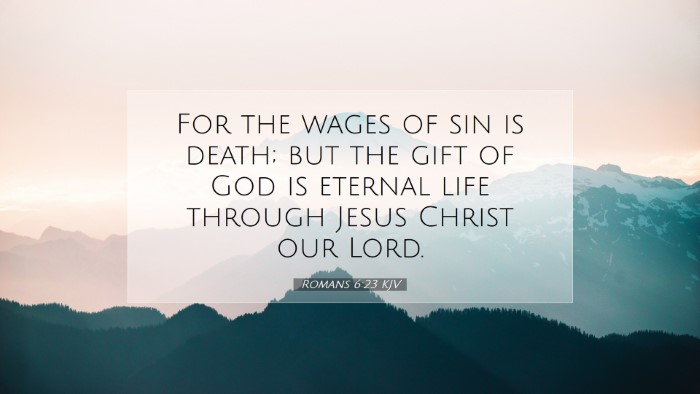Old Testament
Genesis Exodus Leviticus Numbers Deuteronomy Joshua Judges Ruth 1 Samuel 2 Samuel 1 Kings 2 Kings 1 Chronicles 2 Chronicles Ezra Nehemiah Esther Job Psalms Proverbs Ecclesiastes Song of Solomon Isaiah Jeremiah Lamentations Ezekiel Daniel Hosea Joel Amos Obadiah Jonah Micah Nahum Habakkuk Zephaniah Haggai Zechariah MalachiRomans 6:23
Romans 6:23 KJV
For the wages of sin is death; but the gift of God is eternal life through Jesus Christ our Lord.
Romans 6:23 Bible Commentary
Commentary on Romans 6:23
Text of Romans 6:23: "For the wages of sin is death; but the gift of God is eternal life through Jesus Christ our Lord."
Overview
Romans 6:23 serves as a profound conclusion to the arguments regarding sin and salvation. It encapsulates the stark contrast between the consequences of sin and the divine gift offered through Jesus Christ. This verse provides both a warning and an invitation, presenting the essential theological theme of salvation and its implications for believers.
Theological Significance
This verse delineates the consequences of human action—sin—and the corresponding divine response. Commentaries provide various insights that illuminate this understanding:
-
Matthew Henry:
Henry emphasizes that "the wages of sin" signifies not just a penalty but a just reward for actions borne of rebellion against God. He notes that the death mentioned here is not merely physical but also encompasses spiritual death, which is separation from God—a fate that all humanity faces due to sin.
-
Albert Barnes:
Barnes draws attention to the term "wages," indicating that sin incurs a legitimate payment due to God’s holy nature and justice. This highlights the necessity of acknowledging sin’s serious consequences and the fact that eternal separation from God is earned by our transgressions.
-
Adam Clarke:
Clarke expands on the idea of "the gift of God," interpreting it as grace unearned and freely given. He contrasts the earned wages of death with the unmerited gift of eternal life, stressing the generosity of God and His desire for all to receive salvation through Christ.
Contrast Between Wages and Gift
The juxtaposition of wages and gift is critical in understanding the gospel's message. This contrast is a recurring theme in biblical theology:
-
Wages of Sin:
Sin yields a result characterized by death—spiritual death and, ultimately, eternal separation from God. This is consistent with the idea seen in other scriptural references, such as James 1:15. Sin's nature inherently leads to decay and destruction.
-
Gift of God:
In stark contrast to the 'earnings' of sin, God's gift is portrayed as overflowing grace, suggesting that God’s nature is generous and merciful. The gift of eternal life is not something individuals can earn or deserve; rather, it is a blessing that is available through faith in Jesus Christ.
Implications for Believers
Understanding Romans 6:23 has profound implications for Christians:
-
Recognition of Sin:
Believers are called to a sober acknowledgment of sin and its deadly consequences. This understanding fosters a heart of repentance and a desire to rely on God’s grace.
-
Embrace of Salvation:
Clinging to the gift of eternal life necessitates faith in Jesus as Lord and Savior. This gives Christians a solid foundation of hope and assurance of salvation, encouraging a life rooted in gratitude and worship.
-
Mission to Others:
Understanding the dire consequences of sin compels believers to share the message of the gospel with urgency. This highlights the need for evangelism and the moral responsibility to offer the hope found in Christ to the world.
Conclusion
Romans 6:23 encapsulates the entire message of the Christian faith—the stark reality of sin contrasted with the glorious offer of salvation. The insights from public domain commentaries enrich our understanding and deepen our appreciation of the Scriptures, urging scholars, pastors, and students alike to reflect on the transformative power of God’s grace.
As we contemplate this verse, may we be moved to live lives that reflect the hope found in the eternal gift of God through Jesus Christ, our Lord.


